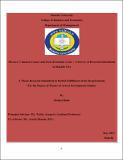| dc.description.abstract | Divorce is acknowledged to be the most traumatic event on divorced individuals exposing them
in to a variety of tribulations. Hence, this study’s’ main objective is to discover the common
causes and socio-economic costs of divorce in Mekelle city. The study has employed both
quantitative and qualitative data types with primary and secondary sources. As a data collection
method, a structured questionnaire was administered to 125 divorced individuals and an
interview was conducted with five key informants in courts, case study was also included. For
the data analysis, descriptive statistics such as frequency distributions, percentages, mean,
minimum and maximum were used to describe and explore the responses. The identified
variables which are considered to be the common causes are found to be momentous causes of
divorce in Mekelle city in which majority of the respondents 65.6% agreed and strongly agreed
as being the common causes of divorce laying the ground for the various socio-economic costs.
Hence, It was found that lack of communication (too much arguing and nagging) is the number
one cause with the average mean response of 4.64 followed by lack of commitment to the
marriage 4.32 and lack of communication (not talking, not discussing) with the average mean
response of 4.13. The results for the social costs also dictate that divorce affects the social life of
divorced individuals, Hence, majority of the respondents 66.4% agreed and strongly agreed on
the variables that most of them except suicide and violence are the social costs that divorced
individuals face after divorce. The variables identified as economic cost are agreed and strongly
agreed with majority of the respondents 80%, which confirm that the economic consequence
identified in this study are considerable. The result of the study also shows that female’s
standard of living decreases after divorce by about 51.74% whereas for male’s it decreases by
12.24% compared to pre divorce period. Thus, the future well-being of any family depends a
great deal on what mother and father do in the home and how they deal with good and bad
circumstances. Recommendations are also forwarded such as Social workers and NGO’s
because of their emphasis on system/ecological perspective should play an important role in this
shift in focus from individual to family in counseling, increase the public awareness about the
benefits of relationship skills training. The religious institutions should also play a noteworthy
role in creating awareness about peaceful family life compared to disrupted ones interacting the
sort of counseling with religious laws. Besides, the government and law makers should be aware
of the ease of the divorce law and reform to rectify the family law in a way that gives more time
for divorcing couples to think over their disrupted family life. | en_GB |


